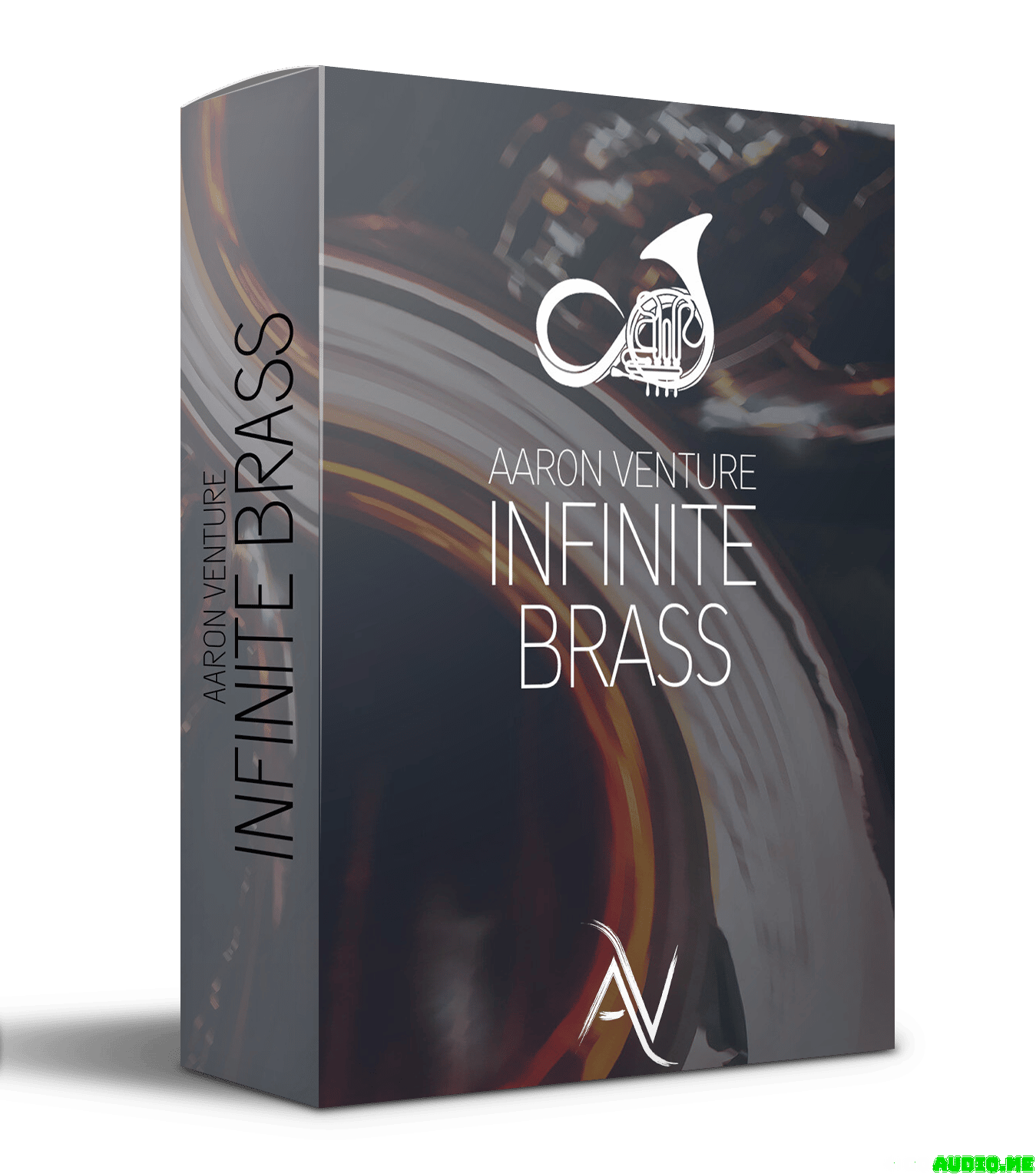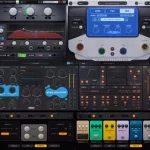Aaron Venture Infinite Brass v1.6 KONTAKT PROPER WELCOME TO THE NEXT GENERATION
WELCOME TO THE NEXT GENERATION
Infinite Brass is a collection of next-gen virtual brass instruments that let you play any line exactly as it sounds in your head – right on your keyboard with no keyswitching – and render your performance authentically with a fantastic, clean, modern sound in one of 3 different spaces.
Build your own ensembles with 29 individual instruments and 13 different mutes. Whether you prefer a more centered sound for concert works or a wide sound for film scoring, 58 positions allow you to create any layout you desire. Infinite Brass comes with 3 standard spaces: the warm Mozarteum, the bombastic Bersa Hall, and the dry Studio. The ambiance is generated in real-time through convolution using bespoke impulse responses unique to each position and room, so the ambiance is always 100% reflecting the performance. Phase-aligned samples result in no perceived cross-fades between the layers; the response is smooth, musical, and sounds like the real thing.
Infinite Brass boasts some of the widest brass instrument ranges on the market and a consistent dynamic range from ppp to fff for all instruments. All instruments have playable vibrato, flutter, and growl, even all three at the same time.
Infinite Brass was chromatically sampled at 48 kHz/24-bit. In spite of all the listed features, these instruments are some of the lightest you’ll ever use, totaling 14.0 GB with only ~50 MB of RAM used per instrument.
A PERFORMER’S DREAM COME TRUE
The end of keyswitching. The sound is the result of Dynamics (def. CC1), Note Velocity, and Note Duration interacting with one another, allowing you to play a single line in an infinite number of ways. That also means that the expression will be unique to you—the player. Infinite Brass also includes Flutter, Growl, and Vibrato controls, all fully seamless.
Aside from some outlandish aleatoric stuff, the instruments can play anything. Think of Dynamics/CC1 as “breath amount”, not the written dynamic. Play any line exactly as you want, playing any “articulation” at any time, including trills, runs, rips, falls, doits, etc.
The engine takes care of non-linear behaviors, then applies them to your input. The result is an organic-sounding performance with no machine-gunning whatsoever, no matter how many shorts you play or how long you keep on trilling.
FULL ARSENAL
From symphonic to big band, you’re all set. You get access to 29 instruments—from the soaring sounds of a piccolo trumpet, down to the ground-shaking contrabass tuba and the raspy cimbassi. Create any configuration you want. Combine different mutes in a line for endless color options.
The mutes can be switched in the interface or using a controller (def. CC26). You can easily swap mutes right in the middle of a line, either during your performance or after the fact in the MIDI editor. If a mute change is initiated in the middle of a note, the swap will be seamlessly done after it ends.
All instruments are equally responsive and fully consistent dynamically and feature-wise across their entire playing range. Don’t worry about compensating in the extremes, correcting for certain notes, or opening your bag of post-processing tricks to get the extra oomph out of the horns in the lower register.
Built-in sample transposition options allow you to quintuple the instrument count—that means 30 horns, 35 trumpets, 60 trombones, and 20 tubas.
YOUR SOUND
The mixer is the sonic cornerstone of Infinite Brass. It allows for control over bespoke impulse responses used in Infinite Series instruments, which offer a stunning representation of brass instruments in a real space.
All the reflections are correctly applied to your performance, and all is done in real-time. There are no weird tails, glitches, and missing ambiance bugs that happen with samples recorded in ambient spaces. Every line, every short note, every slur, every bend or cluster; they all sound like they should, with every nuance of your performance properly reflected in the space.
Create your own sound with the three mic sets, or use one of the 5 mixes. Route out the Ambient mics for different processing or surround uses.
YOUR LAYOUT
The Positioner is a unique feature in Infinite Series instruments, allowing you to change the position of your instrument in space with two clicks, without having to worry about the mix, projection, coloration, stereo image, phasing, and everything else that’s usually a part of the workflow with virtual positioning and reverb plugins.
The library features a total of over 2700 bespoke impulse responses, all curated to bring the dream of a fully modular virtual brass ensemble to life.
Whether you’re after a denser sound where the band is sitting in the middle, or a wider sound for film scoring where the instruments will stay out of the way of dialogue and important sounds usually found in the center channel, or just want the authentic off-stage sound for that Mahler-like setup, you’re always just two clicks away.
LAPTOP-READY
Forget about servers and double-digit RAM requirements. Infinite Brass patches use a ridiculously small amount of RAM per patch, averaging at 50 MB.
Instead, Infinite Series instruments rely more on your computer’s CPU. Since convolution is the key to the instruments’ sound and 3 units are operating at the same time, these instruments are a bit more DSP-heavy than your average virtual instrument. Polyphony stays tight and Infinite Brass never plays more than 5 voices at once per instrument.
Enabling the “Mixed Mic” option switches the instrument to single-convolution mode, which reduces CPU usage by around 40%. It’s mapped to the same controller by default for all instruments, and it does not override your microphone mix, so it’s very easy to switch it on via a button or expression maps during writing/production, then just disable it to go back to your slider mix for rendering, mixdown and/or mastering.
Library size on disk is 14.0 GB, and together with tight scripting, the patches will barely increase your project size; with all 29 instruments loaded, the project size increase is ~4 MB, which means quick loading.
So taking into account the plug-and-play workflow, low memory and space requirements, immediate expressiveness, and vast flexibility, Infinite Series instruments are your ideal pick for low-RAM machines and working on the go.
What’s new in INFINITE BRASS 1.6?
Another big update for Infinite Brass. No new instruments this time, but you’ll find quality-of-life improvements, new workflow compatibility features, sound improvements, new mics, legato improvements, and more.
New Mics
Horns now have the instrument mic available for all positions. Instrument mics are phenomenal for adding detail to your horn lines. Even a single one in an entire horn ensemble will be enough to draw attention. Previously only present in the soloist position (where it replaced the standard Close mic in terms of distance), you can now switch between Close and Inst mics with a single click in the interface. It will even work while Mixed Mic is enabled, as the instrument will swap to a different set of mic mixes.
Low Brass Refresh
With pretty much every other instrument getting a touch-up at some point, now is the time to tighten up the ‘bones.
Along with tone adjustments, trombones now have less low-mid build-in in the room. This low-mid stuff makes it sound full but it will easily clog up your mix if you’re not careful, so I would find myself in a situation where I needed it to cleaner, but couldn’t do anything without negatively impacting the overall tone of the instruments, and based on your feedback, you felt the same. So now if you want to add it back in, just drop an external reverb, EQ out the highs, and dial it in.
The pitch behavior engine has also been updated, so trombones will act more believably in the lowest parts of their range. This, in turn, massively improves the sound of a low brass ensemble playing in unison. You’ll hear this in trumpets and horns, too.
Improvements and Bugfixes
1.6 includes a legato update for all instruments. Based on user feedback, legato has been streamlined to create a better user experience, and it will sound better when it comes to horns and trombones.
The Pitch Bend range is now unlocked. Do note that the instruments are still sample-based, so you’ll get deteriorating quality as you bend more.
The samples are stereo by default. This was done to somewhat counter the static nature of impulse responses. Mono Compatibility will switch the instrument to single-channel mode, increasing correlation when using close mics, in exchange for a slightly more static stereo image.
Close mic panning will now more consistently follow the instrument position. Trumpets also received improvements to their stereo image, resulting in more clarity.
Two of the bug fixes worth highlighting are note-off handling, which will reduce the chance of hanging notes occurring on playback stop, and the phasing fix. With 1.5, some users have experienced completely random phasing issues, and that’s now been taken care of.
Homepage:-https://www.aaronventure.com/infinite-brass


![Toontrack POST-METAL EZX [WIN+MAC]](https://www.goaudio.net/wp-content/uploads/2022/11/Toontrack-POST-METAL-EZX-WINMAC-60x60.png?v=1667349812)





![Toontrack Hollowbody EBX [WIN+MAC]](https://www.goaudio.net/wp-content/uploads/2024/09/Toontrack-Hollowbody-EBX-150x150.png?v=1726103695)
![Toontrack LATEST RELEASES MIDI BUNDLE [SEP 2024]](https://www.goaudio.net/wp-content/uploads/2024/09/gandr-collage-11-150x150.jpg?v=1725764744)
![Blockbuster Sound Sand Dune & Mockingbird [BUNDLE]](https://www.goaudio.net/wp-content/uploads/2024/08/blockbuster-sound--150x150.png?v=1724378090)

![Blockbuster Sound Mermaids Sirens & Horror Pack [BUNDLE]](https://www.goaudio.net/wp-content/uploads/2024/08/Blockbuster-Sound-150x150.png?v=1723854097)



![AEJuice I Want To Learn It All Bundle 2024 [NEW]](https://www.goaudio.net/wp-content/uploads/2024/12/juice-150x150.webp)


